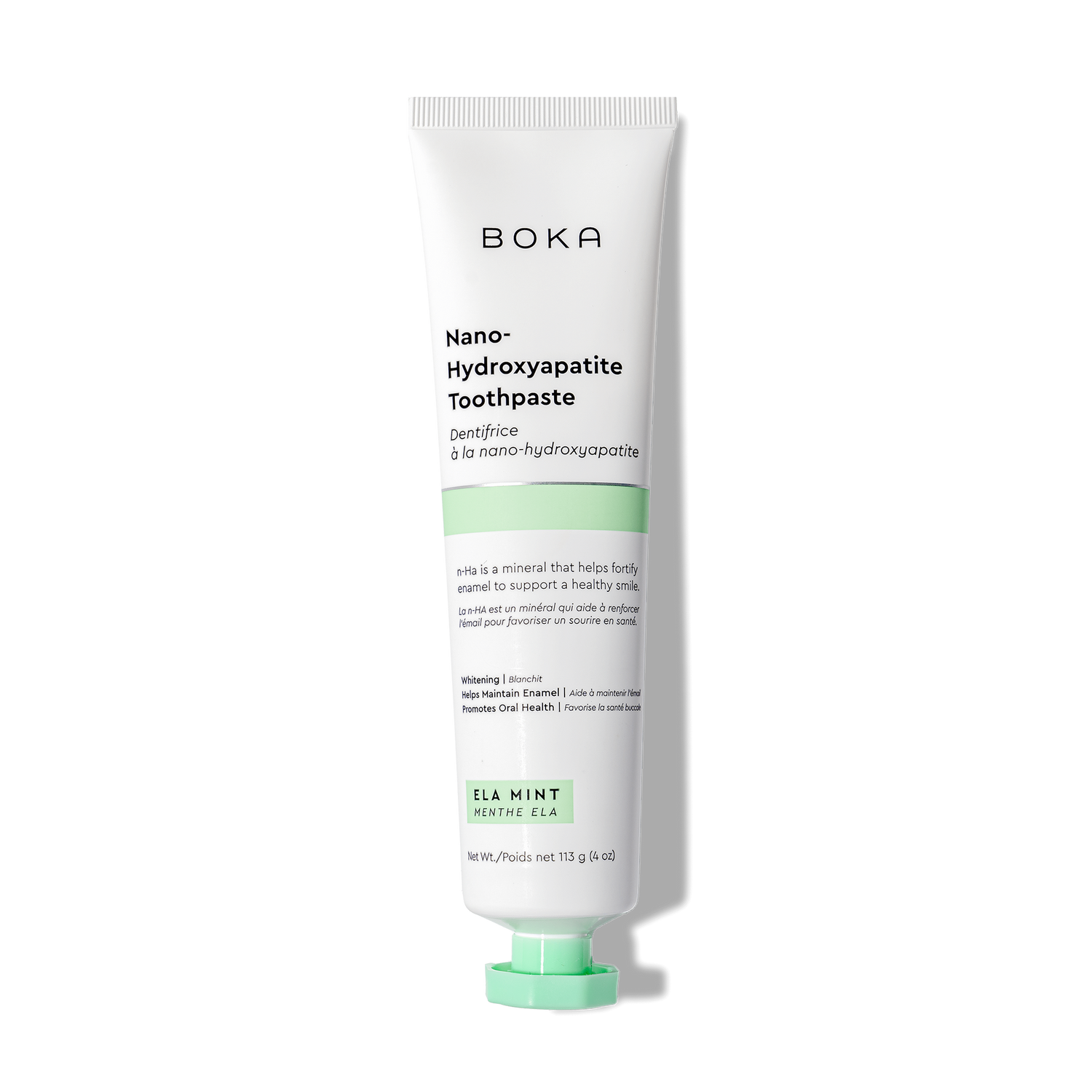Baking soda is becoming an increasingly popular teeth whitening tool, which can even be found in some commercial toothpaste. However, there is some debate when it comes to whether it is safe to brush your teeth with baking soda, or not.
There are many reasons, both for and against using baking soda, which you should know about. We’ll make sure to highlight these in this article, and more. Read on to learn about:
- The benefits of using baking soda as part of your oral care routine
- The downsides of using baking soda on your teeth
- How to use baking soda on your teeth, if you decide to do so
Let's get into it!
The Pros of Baking Soda for Teeth
When it comes to incorporating baking soda into your dental routine, there are some pros and cons to consider before making this decision. First, we’ll explain why baking soda is becoming an increasingly popular tool to use for people’s dental health and appearance.
Natural Teeth Whitener
Baking soda works by polishing the surface layer of the enamel, where surface stains accumulate. Surface stains are often caused by coffee, tea, foods and smoking. They are the most common reason for our teeth’s discoloration.
Removing these surface stains unveils the white layer of enamel, which lies beneath, making baking soda a natural tooth whitener.
People who want to whiten their teeth, but are not comfortable using harsh chemicals such as peroxides to do so, will often incorporate baking soda into their teeth brushing routine.
Neutralizes Acids
Acids are one of the biggest challenges your teeth face. There are many sources of acid, some you may never think about.
The most obvious source of acids is the ingestion of acidic food and drinks, such as sodas, juices, fruit and sweets. However, bacteria are some of the biggest producers of acid in our mouth, and after time they wear away at enamel.
This is where baking soda can help. Baking soda is alkaline. This means that when it comes in contact with acids, such as those found in our mouth, it will neutralize the pH. This helps to protect the enamel against the harmful effects of acid.
Plaque Cleaning Properties
Baking soda is made up of small particles that can scrub away at dirt and grime. This makes it a popular natural cleaning product around the house. It also means that it can be used to clean teeth, as it can remove plaque that accumulates during the day and at night.
Fresher Breath
Baking soda helps to neutralize bad breath caused by acidic food and drinks, including coffee. Its natural antibacterial properties also help to eliminate odor causing bacteria.
The Cons of Baking Soda for Teeth
Whilst there are numerous benefits of using baking soda as part of your oral care routine, there are certainly some drawbacks that you should be aware of. Baking soda can help clean teeth, but this same cleaning action can lead to damage to the enamel, especially if overused.
Enamel Wear
Using small amounts of baking soda can help to scrub away plaque and surface stains. However, overusing baking soda, or using it in high amounts can wear down the tooth’s enamel over time. This is especially true if you are someone who is guilty of aggressive brushing.
This can make your teeth more sustainable to damage, such as chipping and cavities.
If you already have signs of enamel wear, such as sensitive teeth, tooth discoloration, or small chips in your teeth, then it may not be safe to brush your teeth with baking soda.
Increased Sensitivity
Your enamel is responsible for protecting the underlying layer of your teeth, called the dentin, from hot, cold and sweet substances. Without protection, the dentin becomes very sensitive to this.
Because heavy use of baking soda can wear down the enamel, it can result in dental sensitivity. It is important to use baking soda with this fact in mind.
If you start to experience tooth sensitivity to hot, cold or sweet substances, it is important that you stop and let your enamel recover.
Not a Hydroxyapatite/Fluoride Substitute
Whilst you may be wanting to incorporate natural products into your oral care routine, it is important to know that there are some things baking soda cannot do, such as properly protect your teeth.
Whilst brushing with baking soda can help improve the appearance of your teeth, and may help remove plaque build up, it cannot protect your teeth against cavities, in the way fluoride or hydroxyapatite containing toothpaste can.
Substances like hydroxyapatite are used in toothpaste as they help to remineralize teeth, and fill microscopic holes in your teeth, protecting the enamel. Baking soda alone does not have the ability to do this, and therefore does not offer the same protection.
One research study found that the prevention of cavities by fluoride toothpaste was dose-dependent. The participants were better protected against cavities the higher the fluoride content. The American Dental Association (ADA) does not recommend using baking soda on its own because it does not include hydroxyapatite or fluoride, which are essential for tooth decay.
How to Use Baking Soda for Teeth (If You Choose To)
Now that you are aware of the benefits, and downsides of using baking soda to brush your teeth, it is important to know how to use baking soda, if you decide to do so.
Whilst there are some risks to using baking soda to clean your teeth, there are some ways in which it can be used to minimize these risks, and still enjoy the benefits.
Moderation is Key
If you choose to use baking soda to brush your teeth, it is important to use it in moderation.
This means using it once a week, instead of daily, for example. Using baking soda to brush your teeth every day is too abrasive, and can damage the enamel. However, using it once a week can help whiten your teeth, without causing permanent damage to your enamel.
Gentle Technique
If you use baking soda to brush your teeth, it is important that you use light brushing motions, with a soft-bristled toothbrush. This will help minimize the abrasiveness of baking soda, whilst still allowing you to enjoy the benefits of using baking soda.
Not a DIY Toothpaste Solely
For most people with healthy enamel, the occasional use of baking soda to brush teeth will not cause permanent damage. However, it is important that baking soda alone is not used to brush teeth every day.
There are numerous benefits to using fluoride containing toothpaste, such as protecting your enamel from cavities. Without fluoride, or other protection, such as that given by n-Ha, your enamel can quickly wear down, causing problems down the line.
Dental expert Dr Anjum Chaudhary BDS, MDS says, “Teeth can be safely and effectively cleaned and whitened with baking soda toothpaste, not domestic preparation of baking soda. The ADA nevertheless does not support brushing with baking soda alone because it is devoid of hydroxyapatite or fluoride, a crucial component that prevents cavities.”
Who Shouldn't Use Baking Soda for Teeth?
Baking soda can occasionally be used by people with healthy enamel. However, it is not suitable for everyone.
People with Sensitive Teeth
People with sensitive teeth should avoid using baking soda alone to brush their teeth. It is likely that using baking soda instead of toothpaste will worsen existing tooth sensitivity.
For people with sensitive teeth, who still want to receive the benefits of baking soda, there are gentle, baking soda containing toothpaste which can help confer the same benefits, without making sensitivity worse.
Our n-Ha containing whitening toothpaste uses baking soda to help natural whiten teeth, whilst including other ingredients to minimize sensitivity and remineralize teeth.
Those with Braces or Other Dental Work
People with dental work, such as those with braces, implants or other devices should not use baking soda as an alternative to toothpaste. Baking soda can be abrasive to dental restorations, which can result in costly reparations down the line.
If you are still wanting to brush your teeth with baking soda, and have some dental implant, it is important to ask your dentist if it is safe to do so.
Children
Children naturally have thinner enamel that is more susceptible to damage. Therefore, it is not safe for them to brush their teeth with baking soda.
There are certain toothpastes, like Boka’s Kids remineralizing toothpaste which is safe for children to use, and protects the health of their enamel.
If you are concerned about the appearance of your child's teeth, it is important to see a dentist, as they can help find the source of the problem, before it progresses.
Conclusion
Whilst baking soda can have some benefits when used in moderation, such as combating bad breath, helping to whiten teeth and remove plaque, there are some risks if you overuse it.
If you do decide to use baking soda to brush your teeth, it is important that you do so in moderation, and not every day. However, for some people, such as those with sensitive teeth, or with enamel damage, should avoid using baking soda altogether.
Either way, when it comes to making decisions about your oral health, it is best to consult with a dentist. They will give you advice on using baking soda, and will also advise you to use fluoride containing toothpaste, for the health of your teeth.
If you are looking for a toothpaste that harnesses the natural powers of baking soda, but balances its risks with protective ingredients, then try Boka’s whitening toothpaste. Our toothpaste contains small amounts of baking soda, which helps to lift surface stains, along with n-Ha which helps protect and remineralize teeth.

